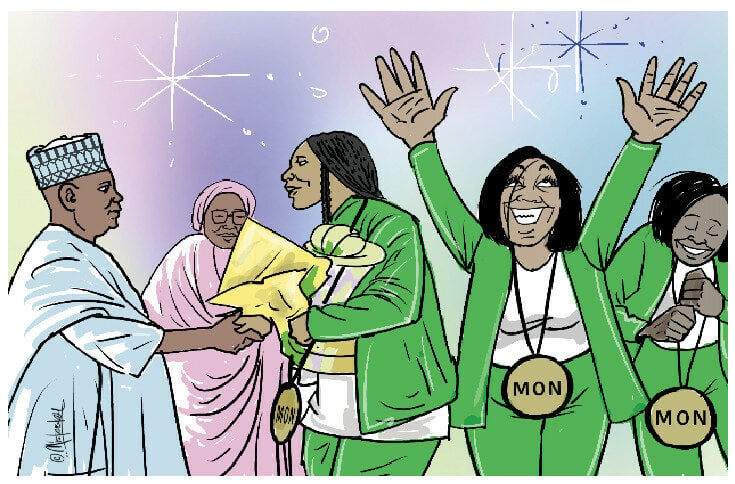In the wake of yet another historic sporting victory, the Nigerian government recently rolled out its usual form of appreciation: cash gifts and plots of land. This time, the recipients were the triumphant Nigerian women’s basketball team, the D’Tigress, who once again proved their mettle by emerging champions at the 2023 FIBA Women’s AfroBasket tournament, marking their fourth consecutive continental title. In a celebratory reception held in their honour, the President of Nigeria commended the team’s effort and patriotism, announcing monetary rewards and parcels of land for each player and official.
Just months before the D’Tigress’ celebrated victory, the Super Falcons also brought glory to the nation by winning the 2025 edition of the Women’s Africa Cup of Nations (WAFCON), reclaiming their position as queens of African football. In a jubilant ceremony that mirrored the one later held for the basketball champions, the federal government rewarded each player and official with generous cash gifts, houses and national honours.
While the recognition was heartwarming and long overdue for a team that has consistently dominated African football and represented Nigeria on the global stage, it also reignited the conversation about the nature and sustainability of such rewards which, equate national service and excellence with material rewards only. Like their basketball counterparts, the Falcons’ story underscores the need for deeper institutional investment in women’s sports and a broader reflection on how Nigeria values and supports those who bring pride to the nation.
Understandably, the gesture was applauded. In a country where female athletes work twice as hard for half the recognition, such rewards signal that their achievements matter. In a struggling economy marked by poor funding and infrastructure, cash or land can mean more than recognition; it can be the difference between survival and comfort.
Yet, this very moment of national pride invites deeper reflection. Is this the only way we know how to say “thank you” in Nigeria? Have we become a society that equates excellence solely with material gain? Are money and land all that Nigerians seek or should receive for being patriotic, hardworking, and successful?
Recognition as Investment, Not Just Reward
The reward pattern has become all too familiar. An athlete or team wins an international tournament, and the government’s response is often the same: hand them a cheque, announce a plot of land in the capital, host a short ceremony, and return to business as usual.
While these gestures provide short-term benefits and a sense of celebration, they do little to tackle the systemic issues affecting performance and progress. Nor do they build sustainable support systems that ensure more people can excel or that those who already do are able to go even further.
For athletes like the D’Tigress, a bigger question looms: will these rewards translate into improved training facilities, better funding for women’s sports, long-term healthcare, or life after retirement from active competition? For every cheque or certificate of occupancy, there are dozens of underlying needs—such as mentorship opportunities, education scholarships, or technical support—that remain unmet.
It is important to separate rewarding success from investing in excellence. The former tends to be reactionary, driven by public sentiment and political optics. The latter is proactive and strategic. It focuses not only on the current champions but also on building the next generation.
True recognition should be both symbolic and systemic. Yes, there should be immediate acknowledgements for national achievements, but these should be accompanied by a more enduring plan that embeds excellence into the fabric of the nation.
For instance, what if every athlete who wins an international medal is automatically guaranteed long-term health insurance, a retirement plan, or even a chance to study abroad and come back to train the next cohort? What if such a person were appointed to a national sports council or policymaking body, allowing them to shape the institutions they once served?
What Else Can Nigeria Offer?
A society that values its talent must offer more than just material benefits. It must offer opportunities, access, and dignity and consider alternative or complementary ways to reward excellence across diverse fields in sports, science, tech, academia, and art.
Exceptional Nigerians, especially those in sports, science, and academics, should receive national honours not as afterthoughts or political favours, but as meaningful, merit-based recognitions. Beyond just titles, they should be invited to advise government agencies, mentor youth, or sit on boards shaping future policy.
Legacy trusts or endowments can be established in the names of high-achieving Nigerians who support budding talents in their field. Imagine a D’Tigress Women’s Basketball Academy that trains girls across Nigeria, funded in part by the federal or state government. Or imagine a Science Fellowship named after a young Nigerian innovator, supporting students from underprivileged backgrounds to study in top global institutions.
Career advancement opportunities can offer athletes roles in national sports administration, sports education, or diplomatic outreach. Scientists and inventors should be facilitated with access to labs, patent support, and entrepreneurial incubators. Students and young geniuses should be supported with scholarships and platforms to showcase their work.
The Risk of a Transactional Culture
The over-reliance on cash and land reinforces a transactional view of citizenship: that patriotism must always be bought, that people only serve for what they will gain, and that once a reward is given, the chapter is closed. This has implications beyond sports; it seeps into national identity and civic responsibility. It risks raising a generation that sees serving Nigeria not as a duty but as a gamble. If you win, you get paid. If you lose, you’re forgotten.
This model is dangerous because it leaves no room for those whose excellence is quiet, cumulative, or unseen. It excludes the teachers who inspire champions, the parents who make sacrifices, and the volunteers who build communities—none of whom receive headlines or national receptions, but all of whom are foundational to national progress.
Changing this culture requires a conscious reimagining of what national reward and recognition should look like. Government policy must evolve to create enduring frameworks for identifying, supporting, and sustaining talent in all sectors, not just sports. Media and public discourse must focus not only on winners, but on the systems and communities that enable them. Citizens themselves must begin to value intrinsic motivations like national pride, community service, and legacy-building, not just financial windfalls. Private sector and philanthropy can play a role in creating long-term support structures, such as sponsorships, fellowships, and mentorship networks.
The gifts given to D’Tigress are a fitting tribute to a team that continues to make Nigeria proud. They deserve every bit of applause and reward for their resilience and brilliance. But beyond the fanfare lies a larger question: Is this the best and only way we know to show appreciation?
If Nigeria is to grow into a nation that truly honours excellence, then it must move from a narrow, materialistic definition of reward to one that is holistic, inclusive, and enduring. Nigerians must not only be celebrated when they win, but they must be empowered to keep winning, and to help others rise as well.
After all, the greatest reward a nation can offer its people is not money or land, it is the assurance that their brilliance will be nurtured, their dignity upheld, and their impact sustained.





